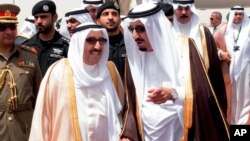As Iran and world powers move toward a possible nuclear deal, Saudi Arabia faces drastic geopolitical shifts. Analysts say lifting sanctions on Iran could greatly increase competition for oil sales, as well as create other far-reaching consequences for the kingdom.
Saudi Arabia and Iran are not friends. And Saudi Arabia is increasingly nervous about a possible nuclear deal between Iran and world powers, led by long-time Saudi ally, the United States.
Gulf State Analytics co-founder Giorgio Cafiero said if Iran gets its deal, which will curb the Iranian nuclear program in exchange for lifting economic sanctions on Iran, Saudi Arabia has a lot to lose.
“Saudi Arabia views the slowly improving relationship between the U.S. and Iran as a great threat to the kingdom’s own interest,” he said.
Iran's influence
The U.S.-Saudi alliance is partially based on a shared fear of Iran, he said.
If, going forward, Saudi Arabia and the U.S. no longer share that fear, he said, the kingdom and its allies in the Gulf believe their value to Western security will “diminish over time.”
But it is not just geopolitical positioning worrying Saudi Arabia, said Cafiero. If international sanctions against Iran are lifted, Iran is set to become a major oil competitor, he said.
Global oil prices have plummeted in the past year, but Saudi Arabia has kept up production to maintain its share of the world market, he says, but this strategy has in some ways back-fired.
“They are trying to protect market shares and squeeze out other oil producers from the market," said Cafiero. "However, Saudi Arabia also is being hit by the negative effects of low oil prices and the kingdom’s coffers are being drained very quickly.”
He said Saudi financial problems are made worse by the “very costly” war in neighboring Yemen.
Oil exports, aggression
Iranian officials have said they want to double oil exports if sanctions are lifted, not only creating competition for the world's biggest oil exporter, but possibly also driving down prices.
On a rainy Wednesday outside the negotiations in Vienna, Camelia Entekhabifard, an author and news commentator, said if no deal is struck, it also could hurt Saudi Arabia by increasing Iranian assertiveness in the region.
“If they do not have the deal, I think, my country, Iran, would be not this friendly country negotiating a deal diplomatically on the table. There are lots of opponents and opposition in Iran, which are not supporting these talks,” said Entekhabifard.
If the nuclear talks fail, she said, it will empower Iranian opponents, who would take a more aggressive stance in regional conflicts.
Iran is heavily involved in the wars in Syria and Iraq, and widely believed to be funding the Houthi militants fighting against Saudi Arabia in Yemen.
Saudi officials and other critics of the nuclear talks say the opposite is true, and that any deal would mean more money for Iran to put into these conflicts.












